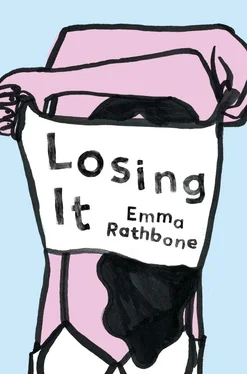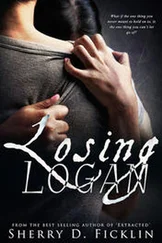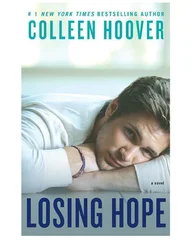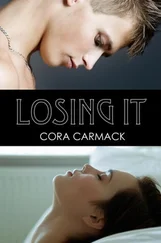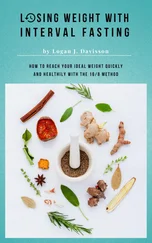
The next day I stood in a small art gallery attached to a sandwich shop, waiting for them to call my name with my order, and stared at an acrylic painting of a bowl of fruit. One of the pieces of fruit had a face and was wearing a court jester’s hat.
“Chance Moon Lively,” said someone behind me.
I turned around. It was Elliot.
“You’re always doing that,” I said.
“Doing what?”
“Coming up behind me and saying something.”
“Oh,” he said. “Well, it’s the name of the artist.”
“Well, it’s the worst thing I’ve ever seen,” I said, and moved to the next painting, another acrylic of a mythic, godlike man holding a lightning bolt, sitting hunched over at a bar.
Elliot was holding a salad in a plastic tub, and here, out of the office and in the light of day, he looked hunched and smaller. His ponytail was pulled especially tight, and I thought I saw some flakes of dry skin where his hair parted.
“He’s a good friend of mine,” he said.
“Oh,” I said.
“Just kidding.” He smiled.
I didn’t want to take the baton and fall into some kind of warm banter with him. I walked to the next painting.
“What, are you really plugged into the local art scene or something?” I said.
“Sort of,” he said, following me. “I actually do know a few people who do stuff. I have a couple friends who own galleries.” He pointed at the lightning bolt painting. “This can be yours for only five hundred dollars.”
“What a steal,” I said.
A woman with a greasy braid and a pinched expression came up to us. She looked at a receipt. “Julia Greenfield?” she said.
“Yes?”
“Your sandwich is ready. We’ve been calling your name for ten minutes,” she said.
“Oh, sorry,” I said. “I’ve just been in here.”
“Well, this isn’t technically part of the shop.”
“Oh, okay,” I said.
She turned and walked away. Elliot was smiling at me. I could tell he wanted for us to be in this moment together, for it to be something we could laugh about, build on. There was something I found unpleasant about his manner — holding a salad, unevenly trying to hit on me when he had a wife.
“Well,” I said, “I better go get my sandwich.”
“Hey,” he said, more seriously, blocking my way. “I’ve been meaning— I wanted to say thanks, again, for the gift you gave me. The sand thingy.”
“Sandscape,” I said.
“What was that?”
“It’s called a sandscape. I finally figured out what they’re called.”
“Right,” he said. “And you can move it — I mean, if you turn it over, it just creates a different picture.”
“Well, that’s your prerogative,” I said.
“Hey,” he said. He motioned with his salad. “After you get your sandwich, do you want to walk to the park together?”
His bearing, the way he asked me, was somehow acknowledging everything that had gone on between us — my crush on him and how I hadn’t caught on that he was married, and I got the sense that he felt sorry for me and was just trying to make me feel better. To be friends. All of this made me angry and I wanted to leave.
“I can’t,” I said, turning back to him. “I have to meet someone.”
“Oh, okay,” he said, disappointed. He hesitated. “I wanted— I’ve been meaning to tell you…” I tilted my head. But then something shifted inside him and he retreated. “Never mind.”
The door to the gallery creaked open and a couple of people walked in. We both watched them for a second.
“Well,” I said, “I’ll see you later.”
“Okay, sure,” he said. And I left him standing there.

It turned out that my date with Gerald was on the hottest day of the year, during an already record-breaking summer. I stared out the window of my bedroom, combing my hair, and thought about how much I didn’t want to go outside and get into my baking car. Everything about this idea now seemed deflated and futile.
We’d decided to meet at a coffee shop and then go from there to his house. I swayed down Main Street at approximately two o’clock in the breezeless afternoon. The storefronts were unpleasantly bright and everything felt smeared. I saw someone listlessly walking their dog, but otherwise it was deserted. My shirt stuck to my back. I felt a little sick. The heat made the empty street feel like another planet, hostile to life.
When I got to the coffee shop and opened the door and recovered from the blast of air-conditioning, I saw him sitting at a table, staring out the window with that same smile.
On my way out there, I’d tried to remember how it was in the class — how we were actually flirting, how I actually started liking him without having to contort myself too much. I remembered his low voice and unaffected manner. I was hoping we would build on our time in there. That our flirtation would layer and gain momentum and we would tap into whatever we had that afternoon. That we would actually get along and the promise of that unexpected spark would be fulfilled. I was hoping.
But the minute I walked inside and the door slammed behind me and he kind of tentatively stood up from his table, my heart fell a little. There was something pleading in his eyes. I sensed that same fragility in him from before. I immediately wanted to leave.
“Hi!” I said. “I’m just going to…” and I motioned toward the coffee counter.
“Sure, sure,” he said.
I ordered an expensive iced drink even though now I was freezing, the sweat on my back having turned cold from the AC.
I sat down across from him. The shop was made out of fresh beams of pale wood and glass. There were serene squares of light on the floor. Aside from the employees, we were the only people there. Gerald nodded a little and smiled and leaned back. He had opaque wraparound sunglasses pushed back on his head, and they revealed two inlets of shiny forehead where his otherwise thick hair was retreating. We were both quiet for a few seconds. There was a clatter outside as an old-fashioned car with a bunch of cans attached to it drove by.
“It’s hot,” I said.
Gerald looked bewildered for a moment and then exploded into agreement. “Yeah! I know. It really is.”
“Are you from there?” I pointed to a key chain on the table. It was a little rubber oval that read “Sonoma.”
“Yeah, yeah, I am,” he said. “I just moved here about a month ago. But yeah, I grew up there.”
“What’s it like?”
“Ah,” he laughed. “It’s nice. It’s a good place to grow up. Do you play?”
“Play?”
He gestured at the table, which had an inlaid checkers board on the surface.
“No. Yeah,” I said. “I mean, I know how to move the pieces around.”
“Great!” He produced, from below the table, a velvet pouch and started withdrawing chips. I was grateful for the time this bought, how it allowed us to concentrate on something else.
“Looks like we’re missing one,” he said.
“We could improvise, use a coin or saltshaker or something.”
He erupted into laughter again and looked at me with bald admiration. “You’re terrific,” he said.
We ended up using a packet of sugar and started playing while also trying to make conversation. The motor finally caught and we got to talking. This is what I learned: Gerald told me, in a stilted way, wherein I had to fill in some of the gaps, that he was raised in a very strict Mormon household out in Sonoma, California, where all his friends and everyone in his community was Mormon. It was very sheltered and close-knit and many things were not allowed and at a point in the recent past, fueled by doubts about his religion, he decided he wanted to see the rest of the world. This caused a major rupture in his family, who said they wouldn’t talk to him if he left the church. He did anyway, and from what I gathered had been a bit rudderless ever since, taking an IT job here and there, and acting on half-thought-out plans.
Читать дальше
Конец ознакомительного отрывка
Купить книгу
